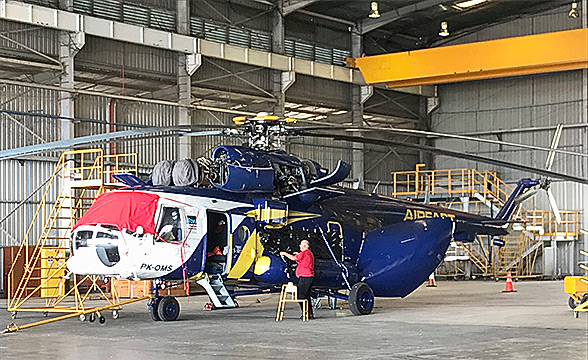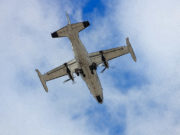
Big changes are ahead for Flight Safety Foundation’s Basic Aviation Risk Standard (BARS) Program.
Not only is the BARS Program introducing a raft of changes as part of Stage 2 updates, but the Program’s Technical Advisory Committee (TAC) also has changed its leadership team.
According to BARS Managing Director David Anderson, the second stage of the BARS Program has been designed to deliver benefits for BARS member organizations, audit companies and aircraft operators.
“The BARS Program was created by Flight Safety Foundation in collaboration with some of the world’s largest resource and mining companies to provide a more efficient means of monitoring, assessing and analysing risks associated with contracted aviation operators,” Anderson said.
“Based on industry feedback and lessons learnt during more than 495 BARS Program audits for over 150 aircraft operators, we have identified a number of areas where we can help enhance global aviation safety for contracted operators.
“From the beginning of [2018], the BARS Program will offer two audit streams leading to registration: Comprehensive Audits and Core Audits.
“The Comprehensive Audit stream, which covers Gold and Silver designated aircraft operators, will provide an enhanced level of recognition and evaluation for the operator,” he said. “The Core Audit stream will allow Green operators to remain in the BARS Program at a reduced level of commitment.1
“Offering the two audit streams will extend the evaluation of implementation and deliver greater flexibility on audit fees and requirements to better address the diverse assessment needs for aircraft operators.”

In recent changes in the TAC’s leadership team, Freeport-McMoRan Director of Aviation Morgan Lamb and Rio Tinto Chief Advisor Aviation Safety Deon Tucker have become the new co-chairs.
“We’re particularly grateful to BHP’s head of aviation, Cameron Ross, who has served as TAC chair and co-chair since 2010,” Anderson said. “He will remain actively involved with the working groups within the TAC.”
“Back in 2010, the first four BARS member organizations were BHP, Rio Tinto, MMG and Glencore.”
“We’re particularly delighted that some of the longest-standing and original BARS member organizations and TAC members have continued to show commitment and collaboration to safety through the ongoing support of the BARS Program.”
He said that other changes to the BARS Program included introducing negotiable fees for audits; dependent on the level and complexity required; revising audit checklists; and instituting a limit on the number of extensions to audit and close-out deadlines.
“For many aircraft operators, the cost of their audits is likely to fall because we are allowing audit companies and their auditors to charge flexible fees, based on the level and complexity of a particular audit required,” Anderson said.
“In addition, the portion of audit fees that usually comes back to Flight Safety Foundation has been reduced, allowing further scope for price flexibility from auditors.
“All in all, we are confident that our three major stakeholder groups — BARS member organizations, audit companies and aircraft operators — will see significant benefits flowing from the BARS Stage 2 evolution.”
For BARS member organizations, the benefits of the changes include:
- Increased safety transparency with annual audits;
- Greater reassurance of conformity;
- Protection of assessment standards; and,
- More timely outcomes.
For audit companies and accredited auditors, the benefits include:
- Reduced overall input costs;
- Flexibility in audit fee arrangements;
- Continuation of audit quality standards;
- Introduction of more evidence-based assessment criteria;
- More regular auditing; and,
- Fewer deadline extensions.
For aircraft operators, the benefits include:
- Ability to negotiate audit fees;
- Opportunity for enhanced qualification with the Comprehensive Audit;
- Opportunity for a reduced level of commitment with the Core Audit; and,
- Ability to advance to a higher registration level and obtain more work.
Anderson said aircraft operators would be able to move between the two auditing streams.
“Aircraft operators will need to select the correct audit stream for them, based on requirements from the BARS member organizations they service,” he said.
“Where our Gold and Silver operators will be in our Comprehensive stream, in the first year of their new, two-year audit cycle, they will undergo a more rigorous evaluation, with increased attention to evidence of implementation of safety procedures and standards.
“In the second year of that cycle, Gold operators will have a shorter, reduced-load Monitoring Audit.
“Our Green operators may choose to remain in the Core Audit stream, which has a reduced level of commitment if they have no immediate need for a higher designation.
“This will allow Green operators to negotiate lower audit fees and undergo a reduced level of requirement. If they wish to advance to a higher level of registration, they will need to undertake a Comprehensive Audit.”
Full details of the upgrade and how it will be rolled out can be accessed on the BARS Program website.
Note
- Green designation means that a BARS audit has been conducted and any Priority 1 (P1) or Priority 2 (P2) non-conformities have been closed. The operator holds a valid BARS registration, which is valid for 12 months from either the closing meeting date or previous registration expiry date. (Audits also contains approximately 8 percent of questions designated as Priority 3, which are optional for the operator to close. P3 non-conformities do not affect the BARS registration status.)
- Silver designation means that a BARS renewal audit has been carried out within the current registration period. The operator has conducted at least two consecutive audits and closed any P1 and P2 non-conformities within the designated due dates. A silver designation is only available in the comprehensive BARS registration stream and is valid for 12 months.
- Gold designation means that at least two BARS renewal audits have been carried out within the registration periods. The operator has conducted at least three annual consecutive audits and closed any P1 and P2 non-conformities. A gold designation is only available in the comprehensive BARS registration stream. A gold designation is available for 24 months, providing a small monitoring audit is conducted at 12 months to renew the BARS registration.
Featured image: © Cobham Aviation Services
Helicopter: © Freeport McMoRan
